Demolition Contractors Shively
Top 10 Local Demolition Contractors in Shively
Receive up to 3 Demolition Companies quotes for your project today! Compare profiles, reviews, accreditations, portfolio, etc... and choose the best offer.
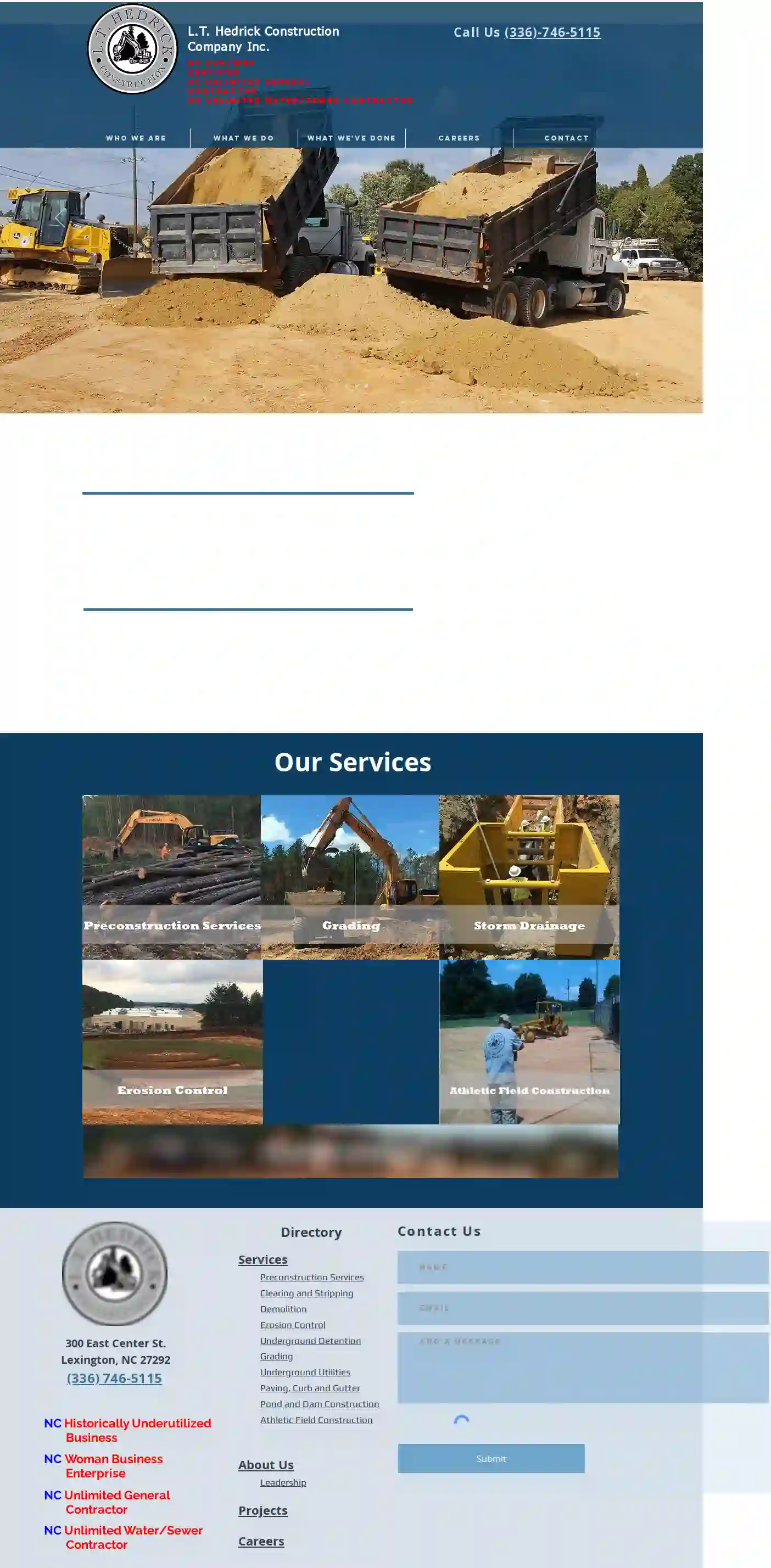
L.T. Hedrick Construction Company Inc.
4.36 reviews300 East Center St., Lexington, 27292, USL.T. Hedrick Construction Company Inc. is a reputable site development and construction firm that has been providing dependable services for more than half a century. Our skill and integrity have earned us a reputation as one of the state's preeminent construction firms. We are known for: On schedule completion. Attention to detail. Highest value for your dollar. Final product exceeding expectations. Honesty, integrity, and transparency
- Services
- Why Us?
- Gallery
Get Quote
CCE, Inc
4.327 reviews211 Busch Place, New Albany, 47150, USC.C.E. Inc. is a locally owned and operated company with over 25 years of experience in the construction industry. We offer a wide range of services to contractors and residents in the Louisville, Kentucky and Southern Indiana area, including: Site Clearing Excavation Roll Off Dumpster Rental Demolition Services Trucking Services Bush Hogging Water / Sewer Line Repair Services Clean Fill Dump Site We are committed to providing our customers with the best possible service at the most affordable prices. We accept all major credit cards. Learn more about our services by reading below or calling us today!
- Services
- Why Us?
- Testimonials
- Gallery
Get Quote
Shingleton Excavating, LLC
5098 Newtown Pike, 5098 Newtown Pike Lexington, KY, Lexington, 40511, USFull Service Excavation & Contracting from Start to Finish We are a full service excavating and contracting company offering a wide variety of construction related services. Being in the heart of Horse Country, we work with many farms to maintain, build and create working spaces for years to come. No Project is Too Small or Large We offer a wide variety of services. Everything from: Excavation, Laser Grading, Land Clearing & Tree Removal, Fill dirt/Create barn pads, Restore & build arenas, Clean out & Maintain Ponds, Road Installation, Water Lines & Horse Waters, Farm Renovations/Demolition. If we can't do it, we can find someone who can! Friendly & Experienced Shingleton Excavating, LLC has been serving central KY for over 20 years. Our experience and attention to detail are hallmarks of the company. We have an extensive inventory of equipment that allows us to complete nearly any job you may have. No project is too large or small. Give us a call today and see how our services can make your next improvement or new installation a quick and worry free endeavor. Leave it up to us! Our sister company, Equestrian Arena Services, assists our customers with leveling, creating and building out the perfect arena for all your horse-needs. We have been building arenas all over the US for more than 20 years & counting! Visit our website for more details and to check out our projects completed.
- Services
- Why Us?
- Testimonials
- Gallery
Get Quote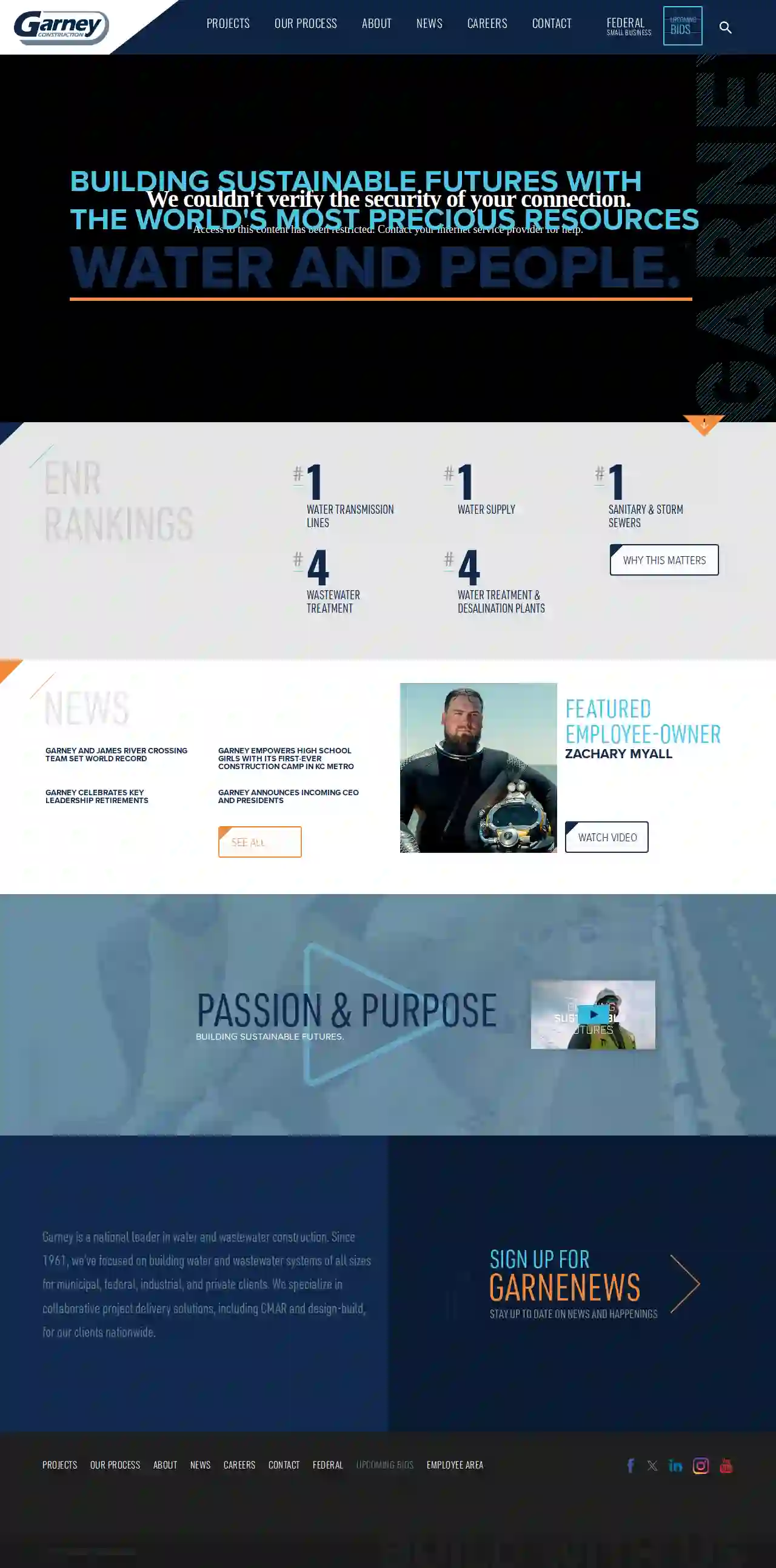
Garney Construction
51 reviewsLouisville, USBuilding sustainable futures with the world's most precious resources: Water and People.® Garney is a national leader in water and wastewater construction. Since 1961, we’ve focused on building water and wastewater systems of all sizes for municipal, federal, industrial, and private clients. We specialize in collaborative project delivery solutions, including CMAR and design-build, for our clients nationwide.
- Services
- Why Us?
- Gallery
Get Quote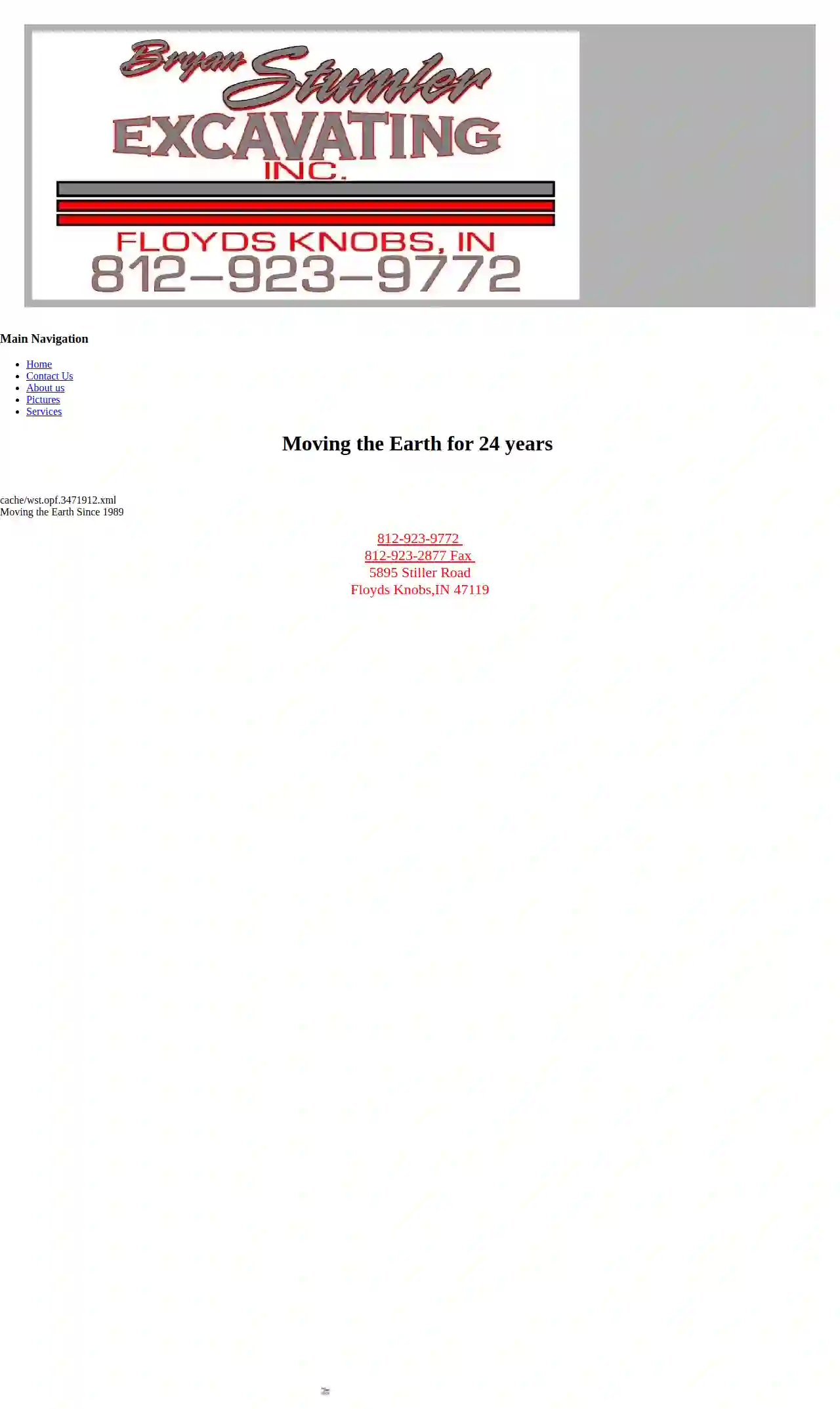
Bryan Stumler Excavating
4.68 reviews5895 Stiller Road, Floyds Knobs, 47119, USAbout Bryan Stumler Excavating Bryan Stumler Excavating is a family-owned and operated business located in Floyds Knobs, Indiana. We have been serving the Southern Indiana area since 1989, providing high-quality excavation and construction services for both residential and commercial clients. Our team of experienced professionals is dedicated to delivering exceptional results on every project, no matter how big or small. We take pride in our commitment to customer satisfaction and strive to build lasting relationships with our clients. We believe in open communication and transparency throughout the entire project process, ensuring that our clients are informed and involved every step of the way. Whether you need a new pond dug, a driveway installed, or a complete site preparation for a new construction project, Bryan Stumler Excavating has the expertise and equipment to get the job done right. We are committed to using the latest technology and techniques to ensure that our projects are completed efficiently and to the highest standards. Contact us today to discuss your project needs and learn how Bryan Stumler Excavating can help you achieve your goals.
- Services
- Why Us?
- Gallery
Get Quote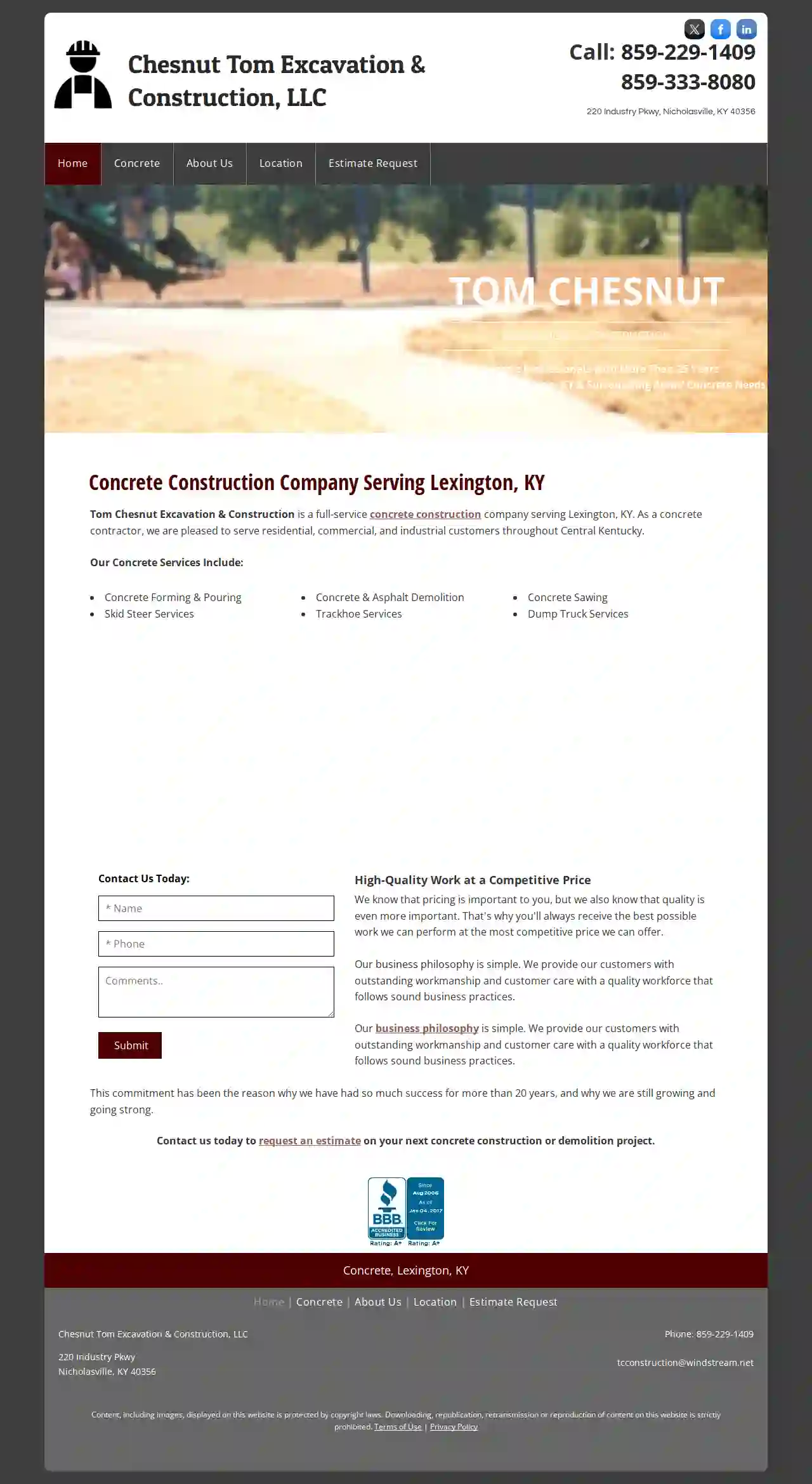
Chesnut Tom Excavation & Construction, LLC
51 reviews220 Industry Pkwy, Nicholasville, 40356, USTom Chesnut Excavation & Construction, LLC Tom Chesnut Excavation & Construction is a full-service concrete construction company serving Lexington, KY and surrounding areas. We are a family-owned and operated business with over 25 years of experience in the industry. We are committed to providing our customers with high-quality work at a competitive price. We are also committed to providing excellent customer service. We believe in building strong relationships with our customers and we are always here to answer any questions you may have. We offer a wide range of concrete services, including: Concrete forming and pouring Skid steer services Concrete and asphalt demolition Trackhoe services Concrete sawing Dump truck services We are proud to serve the Lexington, KY area and we are committed to providing our customers with the best possible experience. Contact us today to learn more about our services or to request a free estimate.
- Services
- Why Us?
- Our Team
- Gallery
Get Quote
Right Track Excavating LLC
4.611 reviewsLexington, USWho We Are In 2021, Gavin Draper founded Right Track Excavating after graduating from Eastern Kentucky University. Having earned a Bachelors of Science in Occupational Safety and Health, he was excited to start his own business. Right Track Excavating quickly became a success, thanks to the duo’s hard work and dedication. They specialize in excavation services for residential and commercial clients, and their reputation for quality work is well-known throughout Central Kentucky. Right Track Excavating is a licensed and insured limited liability company that provides earthwork, erosion control, land improvement and many other services in Berea, Kentucky; Richmond, Kentucky; Lexington, Kentucky; Winchester, Kentucky and Georgetown, Kentucky. Gavin continues to lead the company with distinction, earning a reputation for being reliable and professional contractor. See why we’re rated 5 stars on Google!Call for a free quote – (606) 879-2090 The Right Track Advantage We believe that a healthy, engaged team is key to delivering the best end-product for our clients. We work hard each and every day to earn your trust and for the privilege of being Central Kentucky’s excavating company of choice. Each project is held to the highest standards by our qualified staff, who have enjoyed ongoing relationships with repeat clients as a result. We’ve worked hard over time on building up this reputation for quality work and it’s great that people want us around because we’re always able to provide what they need! We understand the importance of staying on budget. We begin each project by developing a comprehensive budget that takes into account all of the costs associated with the project. Throughout the construction process, we continually monitor the budget to ensure that we are not overspending. We are committed to completing each project on time and within budget. Completing projects on or ahead of schedule is our standard. We’re able to maintain this standard through communication and clarity at every stage, for every stakeholder. With our weekly meetings and look-ahead schedules, we make sure each project stays on track as an excavation contractor for Central Kentucky. The safety of our employees and trade partners is a top priority for us. All workers are required to follow an extensive, well-established safety plan. Through weekly meetings and documented safety inspections, safety continues to remain a top priority for us as an excavation contractor in Central Kentucky. The cornerstone of our business is a belief in the importance and value that we place on relationships. Our low turnover rate, excellent customer service standards for both employees and clients alike reflect this commitment to excellence with every interaction you have!
- Services
- Why Us?
- Our Team
- Testimonials
- Gallery
Get Quote
KayKar, Inc.
1190 Richmond Road, Lancaster, 40444, USWelcome to KayKar, Inc. We are a full service Construction Company offering a wide range of customizable services to fit all of our customers’ needs. Take a look through our site to learn more about what we have to offer, and don’t hesitate to reach out with any questions. One of our team members would be happy to help. ABOUT OUR COMPANY KayKar, Inc. is a third generation, locally owned Central Kentucky family business. We specialize in Earth moving; excavation, land, site and infrastructure development projects. From driveways to drainage ditches, new home sites to munitions bunkers; from leveling and constructing sports fields to land clearing and demolition. Our family’s Kentucky roots span over 200 years working the Commonwealth’s most vital industries. From timber & coal to farms & serving our military; We have served Kentuckians from the Mountains to the Bluegrass. All along the way, we have seen and met all of the challenges this diverse landscape has to offer. Call, Chat or Email us today to schedule a free estimate on your next tough job.
- Services
- Why Us?
- Gallery
Get Quote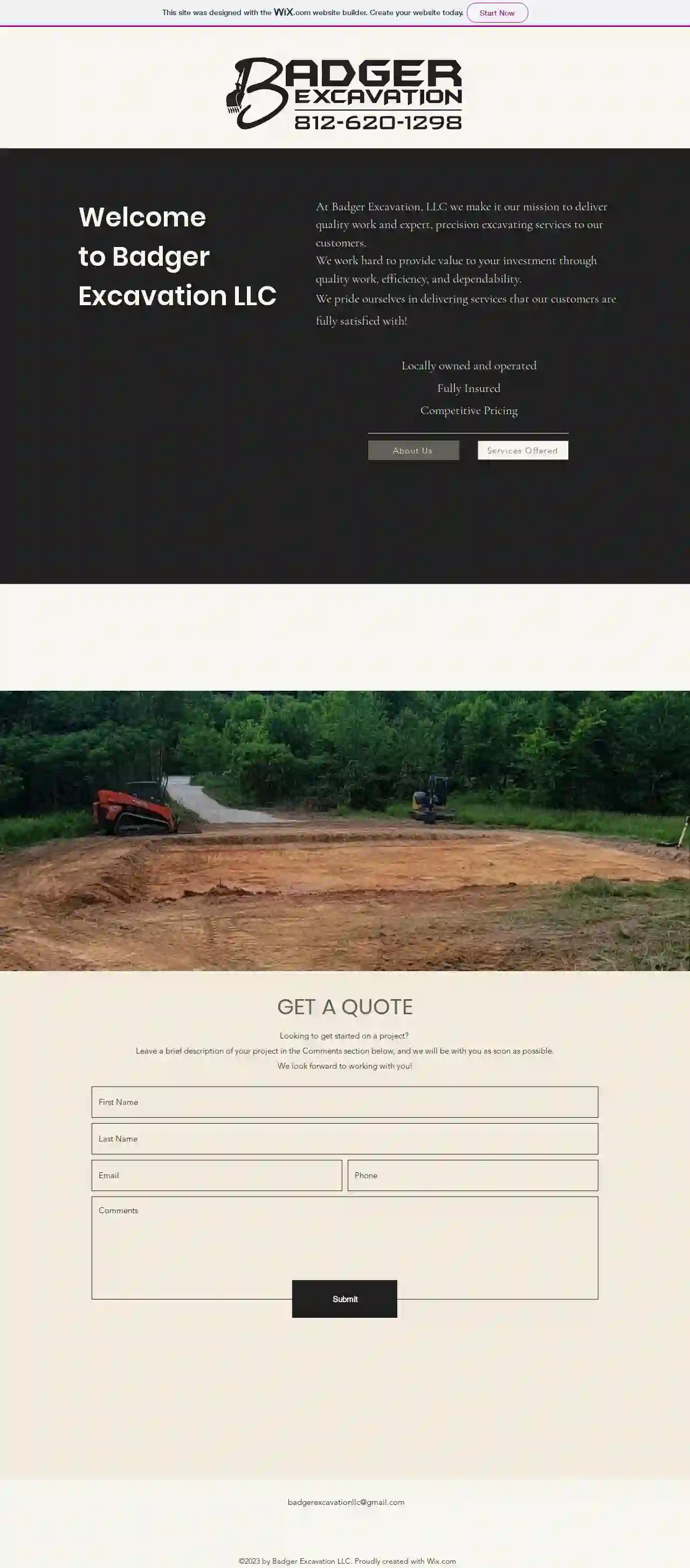
Badger Excavation LLC
53 reviewsLouisville, USWelcome to Badger Excavation LLC At Badger Excavation, LLC, we are dedicated to providing our customers with high-quality work and expert, precise excavating services. We strive to deliver exceptional value to your investment through our commitment to quality workmanship, efficiency, and dependability. We take pride in delivering services that consistently exceed our customers' expectations, ensuring their complete satisfaction! About Us Locally owned and operated Fully Insured Competitive Pricing Get a Quote Ready to get started on your project? Leave a brief description of your project in the Comments section below, and we will be in touch as soon as possible. We look forward to working with you!
- Services
- Why Us?
- Our Team
- Gallery
Get Quote
Stewart Contracting
2.58 reviewsLexington, USWelcome to Stewart Contracting! Stewart Contracting is here to build for you. We offer free quotes and specialize in Barn Building in Lexington, Paris, Versailles and all over Central Kentucky. Our crew is trained to work around your horses and understand safety first when it comes to your horses. References available! RESIDENTIAL or COMMERCIAL Paris, Lexington, Georgetown, Versailles, Nicholasville, Lancaster, Danville and Lexington call Ken 859-621-9011 / FREE QUOTES AVAILABLE Your Central Kentucky General Contractor should be someone who: Has a thorough knowledge and understanding of the coordination and scheduling issues of your construction project Gets things done ON TIME and ON BUDGET Has a team of professionals who works with him to achieve Total Client Satisfaction Has 30 years of experience in Central Kentucky as a General Contractor and hundreds of satisfied customers Takes pride in producing structures that are sound in construction, highly crafted and exquisitely finished Is fully licensed and insured Guarantees their work Works within your Budget Provides Clean, Trustworthy and Dependable Employees Stewart Contracting is proud to be able to say we are this kind of Central Kentucky General Contractor. We are committed to saving you money during the design phase of your project until completion. We are ready to work on all types of buildings, including equine buildings, residential homes and commercial buildings. Our work can include land leveling through the final landscaped finishes. General Contracting for the Equine Industry is our specialty. Our corporate mission is TOTAL client satisfaction by achieving the construction objectives of: quality, on time delivery and staying within the budgets set within every project. This approach ensures that the finished project will compliment the character and the identity of the owner by making a visual statement of design and project criteria.
- Services
- Why Us?
- Gallery
Get Quote
Over 22,076+ Excavation Pros registered
Our excavation providers operate in Shively and surroundings!
ExcavationHQ has curated and vetted the Best Excavation Businesses near Shively. Find the most reliable business today.
Frequently Asked Questions About Demolition Contractors
- Size and Complexity of the Structure: Larger and more complex structures, such as multi-story buildings, require more time, labor, and specialized equipment, increasing costs.
- Type of Demolition: Different demolition methods, such as implosion, wrecking ball, or high-reach demolition, have varying costs.
- Material Disposal: Disposal fees for demolition debris can contribute significantly to the overall cost, depending on the type and quantity of materials.
- Location and Accessibility: Demolition in densely populated areas or with limited access may require more planning and specialized equipment, affecting costs.
- Hazardous Materials: The presence of asbestos, lead paint, or other hazardous materials requires specialized removal and disposal procedures, adding to the expenses.
- 'Can I see proof of your licensing and insurance?' Verify their credentials and coverage.
- 'What experience do you have with projects like mine?' Ensure they have relevant expertise.
- 'Can you provide references from past clients?' Check their reputation and customer satisfaction.
- 'What are your safety protocols?' Prioritize contractors who emphasize safety.
- 'How will you handle hazardous materials?' Ensure they have proper procedures for asbestos or lead abatement.
- 'What is your timeline for completing the project?' Understand the project duration.
- 'How will you manage noise, dust, and debris?' Discuss mitigation measures for minimizing disruption.
- 'What are your payment terms?' Clarify payment schedules and any required deposits.
- Feasibility Studies: Assessing the viability and challenges of a demolition project.
- Demolition Planning: Developing demolition plans, including method selection, sequencing, and safety procedures.
- Permitting Assistance: Navigating the demolition permitting process and ensuring compliance with regulations.
- Hazardous Material Surveys: Identifying and managing hazardous materials, such as asbestos and lead paint.
- Cost Estimating: Providing accurate cost estimates for demolition services.
- Project Management: Overseeing the demolition process and ensuring it proceeds as planned.
How much does demolition cost in the USA?
What questions should I ask a demolition contractor before hiring them?
What is asbestos abatement?
What is the role of a demolition consultant?
How much does demolition cost in the USA?
- Size and Complexity of the Structure: Larger and more complex structures, such as multi-story buildings, require more time, labor, and specialized equipment, increasing costs.
- Type of Demolition: Different demolition methods, such as implosion, wrecking ball, or high-reach demolition, have varying costs.
- Material Disposal: Disposal fees for demolition debris can contribute significantly to the overall cost, depending on the type and quantity of materials.
- Location and Accessibility: Demolition in densely populated areas or with limited access may require more planning and specialized equipment, affecting costs.
- Hazardous Materials: The presence of asbestos, lead paint, or other hazardous materials requires specialized removal and disposal procedures, adding to the expenses.
What questions should I ask a demolition contractor before hiring them?
- 'Can I see proof of your licensing and insurance?' Verify their credentials and coverage.
- 'What experience do you have with projects like mine?' Ensure they have relevant expertise.
- 'Can you provide references from past clients?' Check their reputation and customer satisfaction.
- 'What are your safety protocols?' Prioritize contractors who emphasize safety.
- 'How will you handle hazardous materials?' Ensure they have proper procedures for asbestos or lead abatement.
- 'What is your timeline for completing the project?' Understand the project duration.
- 'How will you manage noise, dust, and debris?' Discuss mitigation measures for minimizing disruption.
- 'What are your payment terms?' Clarify payment schedules and any required deposits.
What is asbestos abatement?
What is the role of a demolition consultant?
- Feasibility Studies: Assessing the viability and challenges of a demolition project.
- Demolition Planning: Developing demolition plans, including method selection, sequencing, and safety procedures.
- Permitting Assistance: Navigating the demolition permitting process and ensuring compliance with regulations.
- Hazardous Material Surveys: Identifying and managing hazardous materials, such as asbestos and lead paint.
- Cost Estimating: Providing accurate cost estimates for demolition services.
- Project Management: Overseeing the demolition process and ensuring it proceeds as planned.